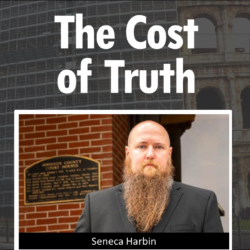In parts one and two, we examined ten misunderstood verses in the Gospel of John. In part three, we’ll examine seven more texts from the rest of the bible:
- Genesis 1.26
- Isaiah 9.6
- Matthew 2.2
- Matthew 28.9
- Matthew 28.19 (cf. 2 Cor 13.14)
- Romans 9.5
- Acts 20.28
Repeatedly, Bill Schlegel calls us back to understand each verse within its immediate and canonical contexts, rather than reading in later theological commitments.
—— Links ——
- Check out the other episodes in the Misunderstood Texts about Jesus series.
- To learn about Schlegel’s backstory, listen to Interview 31: Master’s University Prof. Finds Son of God, Loses Job
- Check out his excellent book, the Satellite Bible Atlas
- Follow Bill Schlegel on his blog or on YouTube
- For an extensive list of verses and explanations from a biblical unitarian perspective, visit christianmonotheism.com (use the scripture index on the right)
- Watch “Five Major Problems with the Trinity” on YouTube
- Intro music: Jazzy Frenchy by bensound.com. Licensed under Creative Commons: By Attribution 3.0 License.







Was only interested in Gen 1:26. He makes some unwarranted assumptions that God is talking to the angels as if they were standing around listening to what God was going to do. Us … our .. our image. Nowhere in Scripture does it state that angels are made in the image of God. Therefore, one cannot say that Let us make man in OUR image, in OUR likeness refers to angels.
He addresses this verse as if a trinitarian heavily relies on it as a prooftext. Not the case. The Us, our our pronouns proves plurality. But, if you take the angel view, that would mean that angels are in the image of God AND they were involved in creation. The lecturer tries to sidestep this by saying the angels did not “create” but are helping man subdue the earth.
In the movie What’s Up Doc? you have the Ryan O’neal asking a judge “Does that make sense”? The judge replied “NO, but it’s consistent”. Consistently misinterpreting Scripture to fit incorrect presuppositions as to who Jesus is .
@Bill Stroup, on Genesis 1:26, note this quote from the Word Biblical Commentary: “Christians have traditionally seen this verse as adumbrating the Trinity. It is now universally admitted that this was not what the plural meant to the original author.” Wenham, G. J. (1998). Genesis 1–15 (Vol. 1, p. 27). A scholar like Wenham doesn’t use a word like “universally” unless he is very confident. You should argue your claim about Gen. 1:26 with trinitarian scholarship.